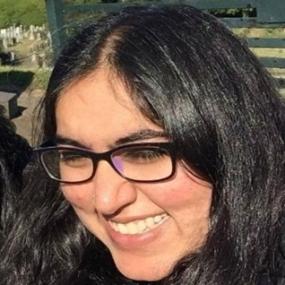It's ok to have a meltdown!

Dual Emergency Medicine and Intensive Care Medicine trainee
I had a bit of a meltdown last year. It is very hard to admit that I had “a bit of a meltdown”. I am going to talk about my struggles. I share this personal account for anyone who needs to hear that it is perfectly acceptable to have a meltdown once in a while. (If you do not want to read any further but would like the list of resources for well-being that I have compiled please scroll to the end).
I started last year quite exhausted after having worked on Intensive care through most of the pandemic. Inconveniently my parents had covid while India was plastered on the news as having run out of oxygen supply, which was absolutely terrifying. I was also generally sad about not having seen my family who live in a different country in over two years. I then had the break-up of a six year long relationship that had been my anchor through the pandemic. This was compounded by guilt at missing my paternal grandmother’s funeral with an aging maternal grandmother who I love dearly but barely get to meet due to distance and circumstances. Work wise in the first few months of the year, I went from working in Intensive care back to my other specialty, Emergency medicine which currently more than ever, is an under-resourced, over-stretched service that is running mostly on the grit of the people who keep showing up to work.
I do not like to make generalised statements, but I think a lot of us in the current NHS walk the fine line between it all being just manageable and burn-out. If there are challenges in one’s personal life then the emotional and physical demands of work seem much harder to deal with. My second generalised statement is that most of us in healthcare like to be in control and lack of control is quite a scary thing, whether it be illness of a family member, death or breakup of relationships. I found myself going from being enthusiastic and deriving a great sense of achievement (and joy) from work to being anxious and tearful a lot of the time. One of the strange emotions that I started to feel was an overwhelming sense of guilt and failure. I should not be feeling sad, I should be in control, I should not be taking little breaks to cry in the toilet at work, I should be more resilient as I was after all better than this. I also had guilt at my problems comparatively not being as big as other people’s, people go through divorces and have more responsibilities and children to look after, all I had to worry about was selling the house we were sharing; my parents had survived covid and the cancer scare my mum had was not cancer after all. I felt I should be grateful if anything, I had a good fulfilling job and loving family and friends. Two sentences that kept running through my head were “Everyone else is managing, what’s wrong with me” and “ my problems are not that big anyway”. I now know that this sort of comparative grief and guilt can do a lot of harm.
It was the way I started to feel at work and about work, that propelled me to finally take action. I started with simple google searches and was surprised to find the amount of resources that we as doctors and especially trainees can tap into. I also posted on a social media group for doctors about wanting help with mental well being and had an outpouring of kindness, along with some fantastic resources and personal stories. I then made a plan to get some of the control back. I informed my supervisors in both specialities that I was struggling and they were both fantastically supportive. I also saw my GP who was brilliant and offered me some time off, which I never ended up taking but just knowing that I could made me feel relieved. For the first time since being a doctor, I said no, I said no to additional projects and commitments on my time. I also toyed with the idea of going less than full time and to be honest, this is something I continue to be undecided about. Out of all the counselling services I picked one that offered face to face sessions to trainees in the region. Walking into the psychiatrists office for the first session was a surreal experience, both intimidating and liberating.
I have actively put in work to feel better. I have worked on my mental well-being as if it was a broken arm that needed the plaster cast and then needed physiotherapy. I am lucky to have supportive family and friends, I have also been surprised by the kindness of acquaintances and strangers. Burn-out and struggling with mental well-being are things that happen to other people, till they happen to you. If you are someone who is battling negative emotions, I want to tell you that it does get better with time and taking small steps can make a big difference, the first step probably is recognising that there is a problem and being kind to yourself. I am a big fan of the “civility saves lives” campaign and in general being kind to colleagues, we honestly do not know what battles someone is fighting. I am not “fixed” nor do I claim to be a mental health expert, but I do know this to be true, there should be no shame or guilt in talking about one’s own well-being. In the current climate it is more important than ever to take care of ourselves so we can do the best for our patients.
Resources (there might be repetition, I have tried to find a comprehensive list of links I found useful):
- https://www.practitionerhealth.nhs.uk/
- https://www.frontline19.com/
- https://www.bma.org.uk/advice-and-support/your-wellbeing/wellbeing-support-services/counselling-and-peer-support-services
- https://www.bma.org.uk/advice-and-support/your-wellbeing/wellbeing-support-services/sources-of-support-for-your-wellbeing
- https://www.aomrc.org.uk/supportfordoctors/
- https://www.yorksandhumberdeanery.nhs.uk/learner_support (deanery specific)
- https://youokaydoc.org.uk/
- https://academy.brainworkshops.co.uk/lab
- https://www.nhs.uk/service-search/mental-health/find-a-psychological-therapies-service/
- Your local occupational health, GP and deanery
- Tea and Empathy group on facebook
Related Content
Written by Dr Laura Coleman
Written by Dr Alexandra Kendall-Smith
Written by Dr Emily Reynolds

